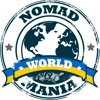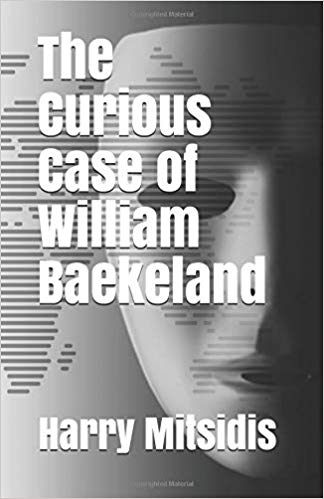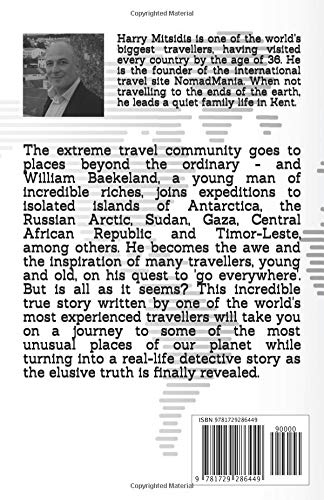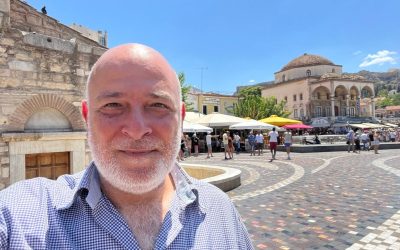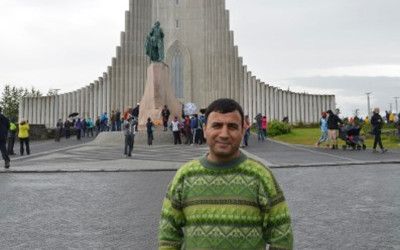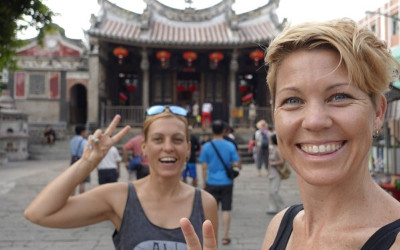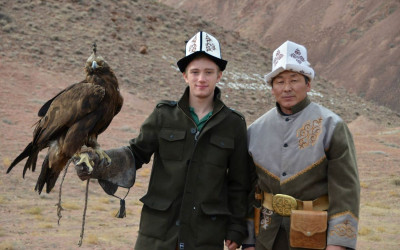The story of William Baekeland will be familiar to many of you in the traveller community. In this issue we talk to our founder, Harry Mitsidis – we interviewed him back in 2014 as well – about the release of his book The Curious Case of William Baekeland (available on Amazon) as well as about NomadMania itself.
Harry, to what extent is The Curious Case of William Baekeland a travel book?
I would say it’s very much a travel book. I am not sure there are many books out there that take you to the New Siberian Islands, Vojvodina, Timor-Leste, Milton Keynes and Ushuaia all within one very real story. The sense of place is very important in the book, and I have tried my best to give a very accurate and detailed account of the many diverse locations involved, without this becoming a ‘we went there and we did that’ kind of book.
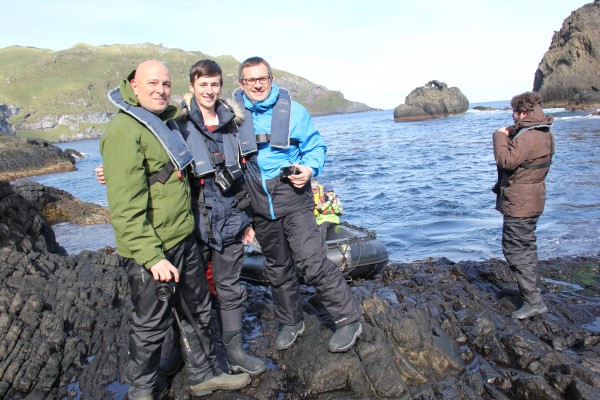
The Second Chapter ends with this photo, taken on Middle island of Tristan da Cunha
So, is this only a travel book?
I would say it’s a unique hybrid. People have always urged me to write a book about my travels, but I never imagined I would end up publishing a true-life travel detective story. It’s difficult to pigeon-hole this book in a particular genre. The first half is a travel story and character development which slowly builds up; the second half is more of a thriller and I am sure readers will be turning the pages in excitement by the time they have reached Chapter 15 or so.
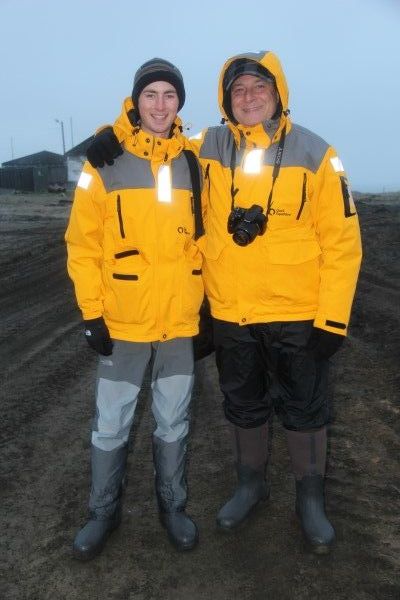
William Baekeland with Harry seen on Ayon, which is featured in Chapter 3
Tell us a little about the writing process from start to finish. What gave you the idea for the book and how did you see it through?
Without wanting to give too much away to the uninitiated, this is a truly incredible story waiting to be told – and a film waiting to be made, I do hope someone takes notice! I feel if anybody was in a position to write this book it was me, as I played a very active part in what is the second part of the book, where it turns into a detective story. Because of the nature of the story, there was also a ready structure in terms of narration, which made it easier to write though I had problems placing the flashback – if it were too early on, I would give too much away, but too late it would detract from the punchlines.
In fact, I wrote the bulk of the book in just 12 days, during a cruise from Durban to the Seychelles last April. In the penultimate chapter, this cruise is even recounted. The passengers on the ship would see me every day in the lounge, dedicatedly typing away, it was a bit of a sacrifice not splashing away in the pool but absolutely worth it, even though writing the second part of the book affected my mood and I found myself often quite aggressive and uncommunicative as a result of having to remember difficult situations. Once the first draft was over, I reviewed some parts of the book and then sent it to a professional editor, who came back with comments by early July. And then the rewriting started, and I confess this was the hardest part, both in terms of finding the motivation and following the editor’s suggestions. It took all the time from July to November to get this done. Publishing it through Amazon was the easy part.
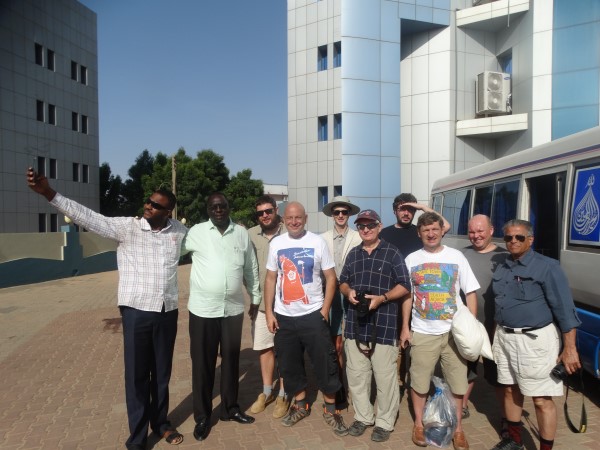
The trip to Sudan is part of Chapter 5 entitled ‘Heat and Dust’
What were the greatest challenges in writing this up?
Initially, the biggest difficulty was in terms of the locations and the characters. I really wanted both places and people to come alive and the description of these in a subtle way that does not necessarily lead the reader was rather hard, but I hope I did what I could. I reviewed many of my photographs in order to pay as much attention to small details as possible.
The editor’s main objection was what she called my journalistic style. She rightly claimed that I had written this almost as if I were an absent observer, not giving away much about myself. This was deliberate, because I initially wanted to let the readers reach their own conclusions, but the editor insisted that unless I become more approachable and more human, then the reader cannot connect with me as a character. I had to rewrite a lot of it in a more personal way, and that is oddly very hard to do, it’s so much easier to write about others!
Another challenge was the lack of female characters in the real story. It was almost like a war story where there are no women. I decided to focus on the description of women where I could, giving them some depth even when this would not serve the story directly.
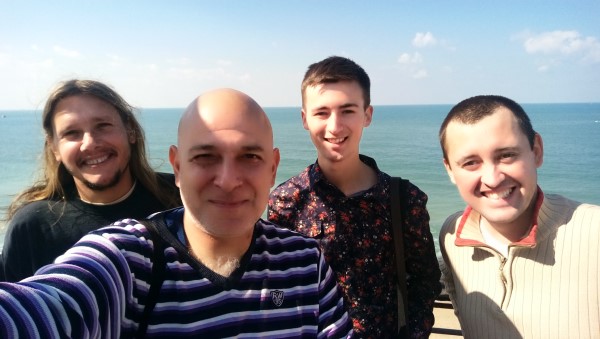
The experience in Israel is also part of the book…
To what extent did you have to change the truth to serve the story?
I have tried to be as accurate and precise as possible. Apart from some obvious name changes, I also needed to focus on some people while ignoring others, so as to not overload the reader with too many diverse characters. There were instances where, to this purpose, I simplified. For example, in the Timor-Leste chapter, the trip to Oecussi is presented as if it were just William and me; but in reality, there was another guy with us, a friend of William’s from Belgium. Introducing him just for this chapter, when he would never be mentioned again, seemed pointless to me, so I adapted this.
And obviously the dialogues are not entirely accurate but their gist is. All places, however, are, as are the dates. There was no reason to change these at all.
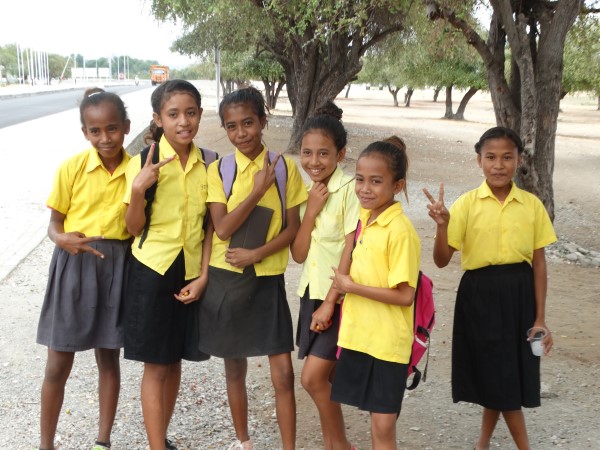
These schoolgirls in Timor-Leste’s exclave of Oecussi are part of Chapter 11
Is this then a very personal project, being your first book?
Actually, this is my first published book – I’ve written two before which I never bothered to publish, one about Yugoslavia and an anthology of travel stories. In a way this book is indeed personal, I would say especially in Chapters 15 and 16 when the action takes place in Serbia, which I adore and have always felt a deep connection to, and in Greece, where I grew up. I ended up describing the neighbourhood where I grew up, so this is truly personal. But on another level, this book is not about me at all, as you can tell from the title, and I have tried to focus on William as much as possible, albeit as experienced from my own perspective.
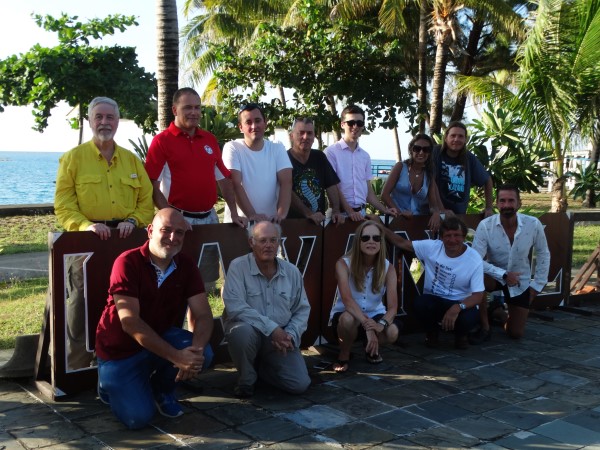
NomadMania Committee’s 1st Conference in Layang Layang makes up Chapter 12
Why did you publish on Amazon and what are your expectations of the book?
I did approach a number of publishers but nobody was interested. I think in general the publishing world is a bit of a minefield and you either have to be incredibly persistent or have the appropriate connections. Amazon is a great solution for self-publishing even though the royalties are only around 30% – after printing costs, tax etc. – of what someone pays for the book. But for me the money is not important at all, the story is what matters. My expectation from this is that as many people as possible read the story. This is really a bizarre case that should be read as a lesson, a character study, a travelogue, whatever you want it to be. Moreover, all proceeds go to charity, in association with my friend and fellow traveller Joao Paulo Peixoto, we have arranged that proceeds go to help fund students from the poor African country of Sao Tome and Principe to study at Joao Paulo’s University of Business in Porto. It’s a good cause and a fascinating story, so I hope people not only read it, but also recommend it to their circles.
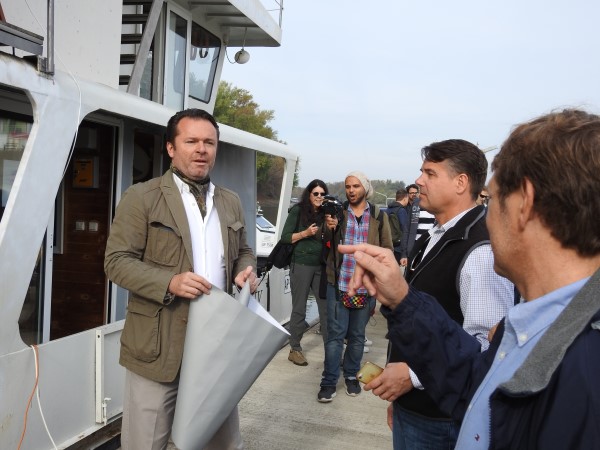
Last year’s ETIC in Serbia is part of the very important Chapter 15
The book was released two weeks ago. How many copies have been sold so far?
According to the Amazon dashboard, 51.
Only?
I read somewhere that an average book sells around 3,000 copies in its entire lifetime and only about 250-300 in its first year. Realistically and without any formal marketing channels, I should not be expecting more than this but I really do hope all people reading this interview will find the interest and generosity to help the cause, as it were. NomadMania has always been free, and we are very giving, so to a certain extent I hope people can ‘give back’ the price of two coffees or so by supporting the book.
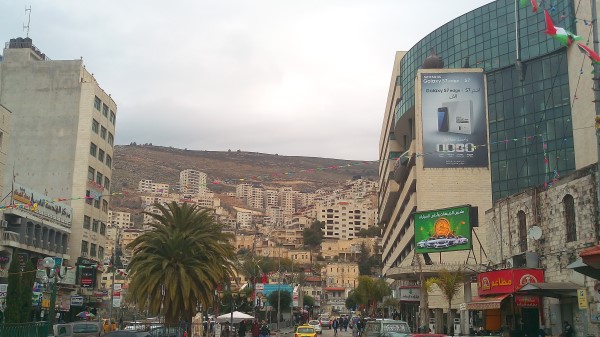
The book also takes one to towns such as Nablus in Palestine
Are you planning a Kindle version or any further editions?
There was no Kindle when I was born! I’m a little bit old-fashioned and against all this technology around us and told myself that I would only prepare a Kindle version – which needs more effort too – if a certain number of printed copies was sold. I hope it does come to that, as I understand some readers, especially in countries where post may be unreliable, may rely on Kindle. Still, in my mind a book is only a book if it is in print.
There is also at least one foreign language version in the works, which is expected to be released sometime next year hopefully. That one will be marketed through more professional, formal, channels, so should have higher sales. What I make from that will also go to the scholarship mentioned above.
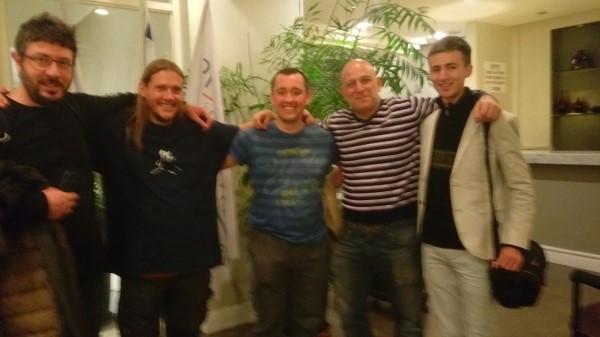
Photos such as this one, taken in Israel, helped in reconstructing images for the narration no matter how blurry…
Now, turning to NomadMania. What are your plans for the website?
NomadMania is now, in terms of content, more or less where I want it to be. The move from The Best Travelled a year and a half ago was not without its challenges but was highly necessary. The rumour mill thinks I sold The Best Travelled and made lots of money, but this is not true at all. The Best Travelled will eventually hopefully be relaunched by new owners who have different plans for it. That website was so incrementally built that we needed to create a new one from scratch to serve avid travellers’ interests, and the result was NomadMania.
I am personally very happy we now include all major travel lists on our website and our Series project is now almost completed, which also enhances the travel experience considerably, I think. Some people really love the site, and they are the reason we continue. For 2019 I think we will be focusing more on design rather than content, as well as marketing; I believe there is still a lot of potential for the website which has not been tapped at all as we have only been focusing on content for the past 18 months.
I’m also exceptionally happy of the trips we have successfully pulled off this year – to Mali, Oceania, Western Sahara and Somalia. We have one in the works for Niger next year. And I believe we will be doing one a year. They are a great way to meet people.
What has been the biggest personal gain for you from NomadMania?
Certainly the people. When I first launched TBT back in 2012 I knew nobody in the travel community at all. I had done all the countries of the world alone without ever thinking there were others out there. And then suddenly this huge community appeared, individualist maybe, high on ego maybe, but at the same time with extremely diverse people whose personalities, ways of life and ways of travel are unique and fascinating. In the end, it is all about people and I am very grateful for all those I have met, whether physically or just virtually.
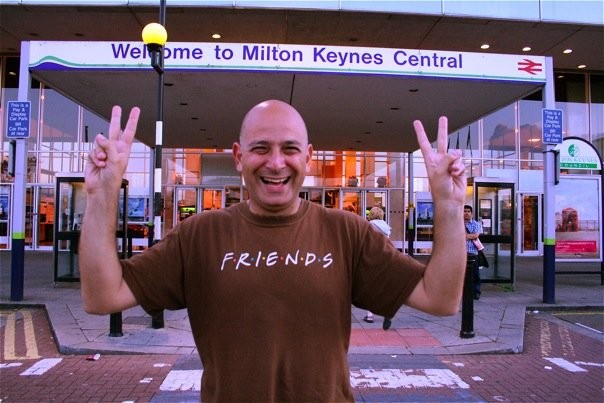
This incredibly tacky photo of the author is taken at Milton Keynes Central station, which is where a very significant meeting in Chapter 13 takes place
You are now ranked number 1 on NomadMania in terms of your regions visited. How does that make you feel?
I feel rather awkward to be honest. I had a dilemma – do I hide a few regions I have been to and stay at rank 2 or 3 or do I reveal everything, which is what we request from all travellers? Ultimately, I had to go with the second choice but being the founder of the website, I just don’t want people to say ‘look at him, he made the list and now he is first.’ I did not make the list of regions, it has always been the result of deliberations with others, and in the last years of our two Committees which total more than 15 people. There are some regions out of the 1281 I disagree with entirely. I would never say I am the world’s biggest traveller or anything of that sort, that would be a ridiculous assertion. At any rate, I won’t deny being addicted to travel, and this year I was rather unstoppable. I will continue travelling in 2019 hopefully but at a considerably slower pace. I am very happy that my travel colleague and true adventurer Sascha Grabow seems committed to the cause and he will deservedly be crowned number 1 soon enough, I believe, relieving me in the process.
Where will you be spending the holidays?
Christmas will be at home in Kent, U.K. under the Christmas Tree with my better half and a good friend who has nowhere better to go, all very quiet and cosy. I will then go to Greece to be with my parents for the New Year. If you read the book, you will know exactly where I will be!
Finally, our signature question – if you could invite any four people from any period in history to dinner, who would be on your guest list and why?
You know, this is the signature question of our interviews but I have never thought of this! Many travellers ‘invite’ famous travellers, but my other love is the cinema, especially of times gone by, and I am more intrigued by this. I would probably invite my favourite actress and actor, respectively, Lee Remick and Sal Mineo. They both died far too young but left their mark on the silver screen even though most of you have probably never heard of them.
I would also invite my father’s father, whose name I have – he died before I was born. Everyone who knew him says he was a very kind, mild man, and he had a very turbulent early life, coming to Greece as a refugee in the 1920s from what is now Turkey. It would be great to get to know him.
And last but not least, and maybe somewhat mischievously. I would have a people’s vote with nominees for bad people and the winner i.e. the worst person (maybe a politician?) would be invited. I would then poison his/her dessert unless that person redeemed himself/herself by the end of the main course. One bad person less on the planet! Then Lee, Sal, my grandfather and I could continue with a liquor and hopefully talk until breakfast time.
The photos in this interview are from Harry’s personal collection.
The eerie book cover was designed by Cedric Shostia, to whom we are very grateful.
